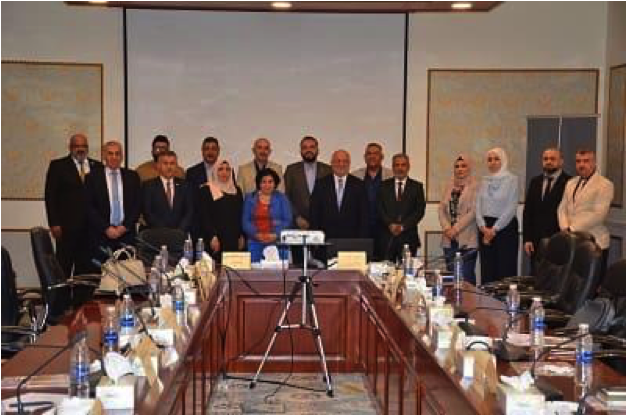Iraq Discusses Return Policies: Challenges and Opportunities
On Saturday, April 6, 2024, Hammurabi Human Rights Organization held a roundtable meeting to discuss policies for the return of migrants and refugees to Iraq. More than 20 experts from governmental and non-governmental organizations involved in migration and refugee issues participated in the discussion, including representatives from the Ministry of Planning, the Ministry of Health, the Ministry of Labor and Social Affairs, the International Organization for Migration (IOM), the International Centre for Migration Policy Development (ICMPD), the European Technology and Training Centre (ETTC), and others. Unfortunately, there were no representatives from the Ministry of Migration and Displaced Persons in the meeting despite numerous invitations to its department heads.
In-depth Discussions on Challenges and Opportunities:
The roundtable focused on six key themes:
● Laws and Legislation: Participants discussed current Iraqi laws, regulations, and policies related to the return of migrants and refugees. They concluded that there is a need for more cooperation with international and local actors to ensure compliance with international standards.
● Data and Statistics: Available data on Iraqi returnees over the past ten years was discussed, with a focus on their distribution by country and area of residence.
● Return Diplomacy: Participants discussed mechanisms for regulating the return of refugees and migrants, including bilateral or multilateral agreements. They also spoke about the previous challenges faced by Iraqi refugees stranded in Belarus and the government measures that have been taken to facilitate their return.
● Reintegration Programs: The discussion focused on programs and policies to ensure the reintegration of returnees into Iraqi society.
● Actors in the Return Process: Different actors responsible for organizing return and providing services to returnees were identified, with an emphasis on the need for improved coordination among them.
● Types of Return: Participants discussed how to handle different types of return (voluntary, forced, assisted) and the infrastructure required for each type.
Outcomes of the Roundtable:
Participants agreed on significant gaps in policies and procedures related to the return of migrants and refugees to Iraq. They reached a set of recommendations:
● Develop Laws and Legislation: The need to revise current laws and regulations to ensure compliance with international human rights standards and provide legal and ethical guarantees for return.
● Conduct Field Surveys: The importance of conducting field surveys to understand the needs and experiences of returnees to ensure improved return policies and programs.
● Develop a National Strategy: The need to develop a comprehensive national strategy to manage the return of migrants and refugees, including specific plans and programs before, during, and after return.
● Enhance Coordination: The need to improve coordination among different actors responsible for organizing the return and providing services to returnees, including the government, international and local organizations, and civil society organizations.
● Support Civil Society Organizations: The importance of empowering civil society organizations to play an active role in supporting returnees and providing them with services.
● Address Root Causes of Migration: The need to address the root causes of migration, such as poverty, unemployment, and instability, to ensure a sustainable and safe return.
Iraq: A Potential Destination for Return and Migration:
Participants acknowledged that Iraq is now more secure, making it a potential destination for the return of Iraqi migrants and refugees, as well as refugees from neighboring countries.
Steps Towards a Better Future:
This roundtable discussion is a significant step towards improving policies for the return of migrants and refugees to Iraq. The recommendations that emerged serve as a roadmap to ensure a safe and dignified return for Iraqis who wish to return to their country and promote their reintegration into Iraqi society.

